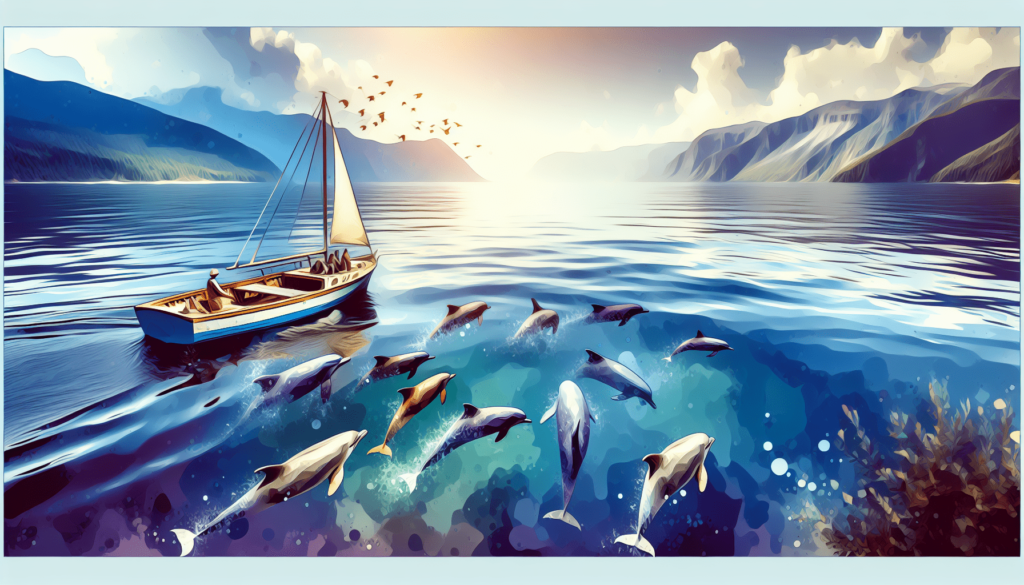“Venture onto the vast azure expanses of the ocean, and you may find yourself in the awe-inspired company of diverse marine wildlife. “How to Handle Boating Encounters with Marine Wildlife” envelopes you in a treasure trove of vital wisdom. Whether you’re a novice sailor preparing to embark on your initial voyage, an avid jet-skier seeking a peaceful coexistence with natural inhabitants of the sea, or a seasoned yacht captain aiming for sustainable encounters, this guide reveals essential guidelines for you to be fully prepared proper interaction steps when confronted by these beautiful residents of the deep.”

Understanding Different Marine Wildlife
Sailing through the endless expanse of blue, waves lapping gently against the hull, you embark on a fascinating journey to decode the secret lives of the aquatic inhabitants of the vast blue expanse.
Recognizing common marine wildlife species
Underneath the azure sheet of water lay myriads of colorful marine creatures, dancing in harmony to the rhythm of the waves. Being able to recognize them not only enriches your maritime adventures but also allows you to respect their space and ensure their survival. Ranging from agile dolphins jumping in unison to magnificent octopuses hiding in plain sight, understanding the rich diversity of marine wildlife is the first step towards a respectful encounter.
Understanding the behaviors of various marine species
Just like we humans possess distinctive behaviors, so do our underwater neighbors. Some marine species may swim alongside your boat curiously – dolphins, for instance, often display such behaviors. Contrastingly, the more elusive species, like certain kinds of sharks, prefer to maintain a respectful distance. By learning about their unique behaviors, you can anticipate their actions and respect their personal boundaries.
Grasping wildlife’s seasonal migratory patterns
Just as birds navigate thousands of miles every year, many marine species also embark on long journeys. Dolphins, for instance, migrate to follow food or reach mating grounds. By grasping these seasonal migratory patterns, not only will you increase your chances of spotting wildlife, but you can also ensure you are not disrupting their essential life processes.
Maintaining Respectful Distance
While the majestic ballet of marine wildlife offers an enthralling spectacle, it’s vital to maintain a respectful barrier to avoid disturbing their natural behavior.
Importance of observing from a distance
In order to enjoy the natural magnificence of these creatures while ensuring their safety and preservation, you must always observe wildlife from a sensible range.
Typical rules for distance between boat and wildlife
While guidelines may vary based on geographic locations and species, a general rule of thumb is to maintain a distance of at least 100 yards from marine wildlife. This respectful distance reduces stress on animals and also minimizes the risk of unintentional harm.
Steps to take if marine wildlife approaches the boat
Should an encounter happen, reduce your speed and maintain course to allow the animal to comfortably pass. If it initiarily approaches you, refrain from retracting abruptly or making sudden movements – this could startle and confuse the animal.
Navigating Around Marine Wildlife
Skillfully steering your vessel around marine wildlife is part art, part maritime ethics. It ensures your personal safety and that of the innocent creatures surrounding you.
Right-of-way rules with marine wildlife
Marine wildlife should always have the right-of-way. Avoid cutting across their path or circling around them, as it might distress or confuse the animals.
Techniques for avoiding direct course with wildlife
Slow down, stay alert and be ready to stop or change course if necessary. Understand wildlife movement patterns and use them to anticipate their path, thereby avoiding direct interaction.
Preventive measures for accidental wildlife collision
Regular maintenance of your vessel and equipment, together with careful observation and maintaining a respectful distance, can prevent accidental collisions.
Reducing Noise Pollution
Anything beyond the soothing sound of waves can be a source of distress for marine wildlife. Noise pollution from boats can impact their behavior, health, and survival.
Understanding how noise affects marine wildlife
Noise from boat engines can interfere with the communication among marine animals, leading to anxiety, disorientation, and changes in behavior. Prolonged exposure to noise can even drive species away from their natural habitat.
Methods to minimize engine and propeller noise
Maintaining engine and propeller in a well-operational state can ensure the smooth and quiet operation. Propellers should be regularly checked for signs of damage, and engines should be frequently serviced to reduce exhaust noise.
Repercussions of excessive noise on marine animals
Excessive noise can have severe consequences on marine wildlife- disruption of feeding patterns, increased stress levels, displacement from habitat, and even premature death.

Embracing Non-invasive Observation
Observing wildlife without disturbing their natural behavior or habitat is indeed a craft of patience and respect.
Appropriate use of binoculars and cameras
Equip yourself with a high-quality pair of binoculars and a zoom lens camera to observe and capture marine wildlife without invading their personal space.
Avoiding flash photography
Flash pictures can blind and startle marine animals, potentially causing them to panic and injure themselves or others around them. Opt for natural light photography to capture their authentic beauty.
Respecting wildlife’s natural behaviors and habitats
Allow wildlife to carry out their activities undisturbed. Never feed, touch, or attempt to lure marine animals. Let nature unfold its majesty at its own pace.
Responding to Distressed or Stranded Wildlife
Coming across an animal in distress can be an overwhelming experience. However, knowing what to do can provide them with a fighting chance.
Identifying signs of distress
Abnormal behaviors such as listlessness, erratic swimming, or visible injuries can be signs of an animal in distress.
Safe and responsible actions during strandings
Never attempt to push a stranded animal back into the water. Instead, provide it with shade, pour water over it to keep it cool, and reach out to relevant authorities at the earliest convenience.
Notifying relevant wildlife authorities
Report the situation with complete details such as number of animals, species, location, and apparent injuries to the relevant wildlife authorities.
Limiting Waste Disposal at Sea
Being a part of the vast oceanic community, it’s your duty to work towards the conservation of the marine environment.
Understanding marine pollution levels
Marine litter can severely affect the health of both marine wildlife and the ocean ecosystem. Non-biodegradable wastes such as plastic wreaks havoc on the aquatic world, ensnaring animals or being mistaken as food.
Responsible waste management on boats
Practice responsible waste management by carrying back your litter to shore for proper disposal. Avoid discarding fishing lines or nets overboard as they could potentially ensnare marine animals.
Impact of littering on marine animals and their environment
The waves could carry your litter miles away, contaminating pristine habitats and becoming lethal ingestion for innocent creatures. Littering at sea can have catastrophic consequences like habitat destruction and species extinction.
Promoting Conservation Education
As boating enthusiasts, you are in a unique position to influence and educate your peers about marine conservation.
The role of boaters in marine conservation
By practicing responsible boating, you can help protect marine life and preserve their habitats. Sharing your experiences can also influence others towards practicing mindful boating.
Importance of sharing experiences and knowledge with others
Sharing your experiences may enlighten others about marine life, their behaviors, and the importance of their conservation, thereby creating a ripple effect of awareness and respect.
Educational resources for boaters about marine wildlife
Investing time in educating yourself about marine wildlife contributes to more informed and respectful encounters. Numerous resources such as books, documentaries, and training programs can help broaden your understanding.
Ensuring Safety for Boaters and Wildlife
Your adventures at sea should never be an adventure for marine life. Your safety and theirs should always be the priority.
Avoiding illegal wildlife interaction
Interactions such as feeding, touching, or disturbing marine wildlife is illegal and detrimental to their wellbeing. Ensuring a respectful and safe distance from wildlife is crucial for their protection and your safety.
Reporting illegal activities involving marine wildlife
If you notice illegal activities such as poaching or deliberate harassment of wildlife, immediately notify local law enforcement authorities.
Safety protocol for unexpected wildlife encounters
In the case of unexpected close encounters with wildlife, remain calm, avoid making sudden movements, and slowly move away. Don’t forget to inform local wildlife authorities about such encounters.
Recognizing the Importance of Regulations
Regulations exist to protect and conserve marine wildlife. Be aware of them, respect them and follow each one meticulously.
Understanding marine wildlife protection laws
These laws are in place to ensure the survival and health of marine wildlife. Violations such as harming, harassing, or feeding wildlife are generally prohibited.
Consequences of violating wildlife regulations
Violating these regulations can lead to hefty fines, imprisonment, or both. More importantly, it may lead to unnecessary stress or harm to the marine animals.
Reviewing local guidelines and policies involving boating and wildlife
To ensure responsible boating, familiarize yourself with local guidelines, policies and regulations involving boating and wildlife. As stewards of the sea, let us sail mindfully, respect all life beneath the waves, and pledge ourselves to the conservation and well-being of our stunning marine wildlife.

